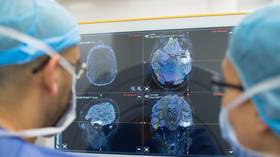Musk’s Neuralink interface caused ‘extreme suffering’ in monkeys, doctors say

Elon Musk’s brain-chip company Neuralink has caused horrific damage to test monkeys, according to a complaint filed by the Physicians Committee for Responsible Medicine (PCRM) on Thursday and seen by the New York Post. The complaint, filed with the US Department of Agriculture (USDA), concerns Neuralink testing on the monkeys carried out at the University of California at Davis from 2017 to 2020.
The group has accused Neuralink and its host university of nine violations of the US federal Animal Welfare Act, noting in their complaint that “many, if not all, of the monkeys experienced extreme suffering as a result of inadequate animal care and the highly invasive head implants during the experiments.” It reportedly goes on to claim that the Neuralink implant procedure “produced recurring infections in the animals, significantly compromising their health, as well as the integrity of the research.”
They have also sued UC Davis to obtain more photos, videos, and information about the test monkeys, saying that the only such material that has been made public has been heavily curated by Musk’s company, showing a healthy-looking monkey playing a video game, supposedly with its mind. The university has denied any wrongdoing.
Aside from publicizing the clip of the monkey gamer, Musk has remained silent about the results of the animal Neuralink trials. In December, he suggested human trials will begin this year, and even went so far as to post a job listing seeking a clinical trials director last month. However, the project has experienced delays before – Musk declared last March that human trials would begin within months, even though the Tesla tycoon has yet to move beyond pigs and (non-human) primates.
While it’s not clear if the suffering the monkeys allegedly experienced is related to the delay in entering the human test phase, the degree of trauma cited in the complaint suggests Musk and his researchers may have to make some design improvements before testing their invention on humans.
One monkey reportedly described in the complaint was found missing extremities “possibly from self-mutilation or other unspecified trauma,” and was later killed during a “terminal procedure.” Another monkey had holes drilled in its skull in order to implant the Neuralink electrodes directly into its brain – only to develop a “bloody skin infection” and be put down. And a third appeared to survive the electrode implantation, only to be overcome with “vomiting, retching and gasping.” Days later, it allegedly “appeared to collapse from exhaustion/fatigue” and finally died, revealing it had suffered a brain hemorrhage.
The primates described by the Post were just three of the 15 experimental subjects – out of 23 test monkeys in total – that died or were euthanized during the three year period covered by the complaint.
Musk initially sold the idea of Neuralink as a brain-boosting implant to help humanity keep pace with the development of artificial intelligence, warning that otherwise we would be relegated to the status of “house cats” ruled by computers.
However, he has more recently scaled back that rhetoric, claiming that its primary use will be to help paralyzed people and others with brain injuries improve their quality of life.
He hasn’t stopped touting the ease with which a Neuralink can supposedly be implanted into the user’s brain, however, insisting it can be done in an hour without general anesthesia. He also described a future where Neuralink implanting centers are as ubiquitous as ear-piercing kiosks were in American malls.













